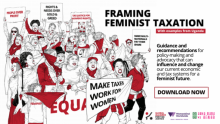Everywhere, women tend to proportionately pay more taxes and benefit less from them, as gender-biased and regressive tax systems continue to deepen gender inequality. While the socio-economic crisis triggered by the COVID-19 pandemic has worsened this situation, it only highlights the urgency for structural changes to make taxes work for women. The book presents a feminist intersectional and human rights-based approach to fiscal policies, using examples from Uganda, providing tools to assess the gender bias in current tax systems, and how to advocate towards a tax system that enables substantive gender equality.
